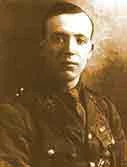
In 1903 at the age of sixteen, Henry got a job at the Post office, his father had died and Henry found himself having to support his widowed mother who was left with ten children.
In 1914, He volunteered to fight for his Country, he first joined the Cameron Highlanders then the Manchester Regiment, attaining the rank of Sergeant Major. He later gained a commission as a Second Lieutenant in the Duke of Wellingtons Regiment.
By 1915 Henry was on active service on the Somme where he showed great bravery, saving the lives of a number of his comrades, for this he was awarded the Victoria Cross which he received from King George V. He also saw action at Ypres, Messine Ridge and the Menin Road. In this theatre of war he was also awarded the Belgian Croix de Guerre and the French Medaille Militaire.
In Italy he again demonstrated great courage against the Austrian forces, at the Asiago Plateau he was awarded the Military Cross and a Bar to Military Cross at Piave. In 1918 he rose to the rank of Major. During his army career hed been wounded on two occasions.
In 1925 after a short return to the Post office, he and his brothers opened retail grocery shops on Rochdale Road and Upper Chorlton Road, their V.C. Pies were very savoury and very popular.
As a Licensed Victualler, Henry also tenanted a number of Hotels including the Crown at the corner of Ancoats Lane and Oldham Road.
During the Spanish Civil war he joined the International Brigade ranked Commandente Generale, and was awarded the Grand Laurelled Cross of San Fernando. Then in 1939 he re-joined the British army at the age of 52 giving much valued service.
In 1960 Henry Kelly V.C M.C. died in Prestwich Hospital. his remains lie buried in Southern Cemetery Wythenshawe, marked by a grey granite monument. His medals are on display at the Duke of Wellingtons Museum in Halifax.
text form V.C. Cypher "On 4 October 1916 at Le Sars, France, Second Lieutenant Kelly twice rallied his company under the heaviest fire and eventually led the only three available men of his company into the enemy's trench, remaining there bombing, until two of his men became casualties and enemy reinforcements arrived from the rear. He then carried his wounded company sergeant-major back to our trenches, a distance of 70 yards, and subsequently brought in more wounded."












